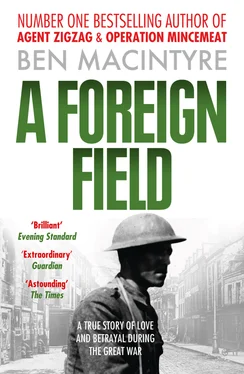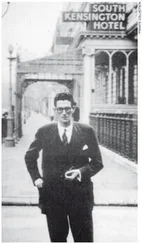One word was what she now issued as the exhausted Englishman was ordered to sit beside the stove. The grandchildren clustered and stared at the soldier, while Marie Coulette prepared food and Marie-Thérèse dressed his wound. Florency insisted that the Englishman stay, at least until his injured arm had properly healed, but Digby declined. Restored by the food and warmth, he thanked Marie Coulette and the others in barely accented French. At dusk he struck out into the countryside again, this time heading north-west, perhaps hoping to slip past the right flank of the advancing Germans and eventually reach the coast.
A dozen pairs of Dessenne eyes watched him as he headed off across the fields. Among them was a particularly large and arresting pair belonging to Claire Dessenne, the nineteen-year-old granddaughter of Marie Coulette, the daughter of Eugénie and, by common agreement, the prettiest girl in Villeret. It is quite possible that Digby, exhausted and on the run, did not fully register Claire’s presence during his first, dramatic appearance in the Dessenne homestead; but equally it is impossible to imagine that if he did see her, he would have quickly forgotten her.
Private Digby crept through a land on which a brittle peace had settled. Although Uhlans no longer roamed the lanes, a few German soldiers had been left behind to guard sites of strategic importance and maintain order in what was now occupied territory, and fresh troops continued to stream down the main roads heading towards the battle front.
Digby’s actions over the next few days followed no discernible pattern. He might sensibly have turned south, to follow his retreating comrades, or struck out towards the coast, or gone north into Belgium and Holland as others had done, but instead of continuing on his north-west bearing he went to earth, and waited. The rolling land, dotted with copses and latticed with rivers and streams, offered ideal cover, and the locals later commented on how well Digby appeared to understand the obscure sustenance and contours of the Picardy countryside. During the day he slept and hid in thickets; only at night did he venture into the open, avoiding the villages and larger roads, darting under cover at the first hint of danger. When the food the Dessennes had given him ran out, he began gathering wild fruit and vegetables from the fields. The hedgerows teemed with raucous life: robins, larks and nightingales sang as if the battle had never been, and would never return. Moving from one concealing grove to another, Digby shared his hiding places with deer, rabbits and wild boar. And creatures like himself.
In the Grand Priel woods that lay beyond Villeret, Digby stumbled upon Privates Thorpe, Donohoe and Martin, standing exactly where the French cavalryman Bastien had left them, too terrified to quit the protecting shelter of Theillier’s woods. Perhaps men who had spent so long in uniform felt, wrongly, greater safety in numbers. The woods were so close to Villeret that even lighting a fire would invite notice. So, like some unlikely Pied Piper, Digby urged the trio to follow him. That night they slipped out of the woods and pushed north, in precisely the wrong direction. For three days, their anxieties steadily rising, they moved from one patch of woods to the next, avoiding every human being and praying for deliverance. Starving and filthy, expecting at any moment to be captured or killed, they adopted a near-feral existence.
Near Walincourt, a farm hand and his dog discovered the men hiding in the undergrowth. Recognising them as fugitive soldiers he led them to a safer patch of thick woodland outside the village. Their uniforms were clearly a serious liability: in battledress they were instantly identifiable, not just to enemy troops, but also to over-inquisitive locals; but without their khaki they ran the risk of being treated as spies if captured, and executed.
The farm hand agreed to hide their uniforms and later returned with civilian clothing. But it seems he also spread word of the men’s whereabouts for within hours more stragglers from the Mons retreat began to emerge to join Digby’s party – directed there by locals anxious to help, or possibly eager to move such human liabilities off their hands.
The first soldiers to arrive were Harry May, a private from the Hampshire Regiment, and Willie O’Sullivan, another Irishman. Then Jack Hardy, a raw-boned Lancashire boy, presented himself accompanied by another young soldier whose age, eighteen, became preserved in local memory, but not his name. A few days later a further Frenchman appeared in the copse, delivering to the band one Corporal John Edwards, a little food, and some encouraging news: the Germans had been pushed back from Péronne and the town was once again in French hands, offering a break in the German line and the possibility of escape and return to their units. After a brief conference the soldiers, now numbering nine in all, struggled to their feet and ‘set off to try to reach the gap’. Once again they were in the open, a desolate troop of uniformed refugees searching for the battle line.
By September 1914 the opposing armies, having locked in a wrestler’s clinch across the River Marne, were now staggering back towards Villeret. The German army that had marched through Le Câtelet chanting ‘Nach Paris’, whose soldiers had been promised they would be ‘home before the leaves fall’, was now itself in retreat. Above the River Aisne, the German army dug in and fought back. Duelling artillery could be heard once more south of Le Câtelet. ‘The French are here,’ the children shouted. ‘Those are French guns.’ Léon Lege, the town notary who had suffered the indignity of being held hostage just days before, now ‘wept with joy’ as an advance party of French troops arrived in the village and the German sentries melted away. ‘It’s over,’ the French officer told him. ‘You won’t see those Germans again, except for stragglers, and all you have to do is give them a kick in the arse.’
The military situation became all but unreadable as the front line lurched back and forth. This was warfare as fluid and erratic as the coming trench battle would be static and predictable. When news spread that Péronne had been retaken by French troops, scores of Frenchmen of fighting age and some army stragglers moved swiftly to cross the lines and link up with the allied armies – exactly what Private Digby and his band were now attempting to do but without the benefit of local knowledge. With victory and liberation seemingly imminent most of the civilian population and the concealed remnants of the British army hunkered down and waited, assuming the battle would pass through and on, as it had done before. Few expected a world war to be waged in their back gardens.
On 16 September, as the village mayor later reported, ‘Villeret became French once again’, and a French ‘cavalry division composed of chasseurs, cuirassiers, dragoons, cyclists and machine gunners’ surged up the hill from Hargicourt into the village. ‘It was a day of celebration.’ Had Robert Digby chosen to remain in Villeret, enjoying Marie Coulette’s hospitality and her granddaughter’s gaze, he would have been able to rejoin the allied forces and this story would be very different. Indeed, it would not exist at all.
Villeret’s moment of elation was short-lived, however, for the battle line that had flexed northwards in a precarious arc was now bending in the opposite direction; the momentum that had brought the French troops back to Villeret and Le Câtelet slowed, stopped, and then abruptly reversed, as a flood of German soldiers poured down from the north, turning the tide once more. The French horsemen vanished from Villeret as suddenly as they had arrived. On 21 September a French machine-gun troop dug in at Cologne Farm, on the ridge above the village and opened up briefly at a squadron of mounted Uhlans. But an hour later they, too, had packed up and retreated. As the French gunners sped down the mill road, ‘there was an exchange of fire with the German horsemen who were following from a distance. Two animals were left dead on the ground.’ The fickle war then evaporated once more. The people of Villeret would not see their compatriots in uniform again for four years.
Читать дальше












